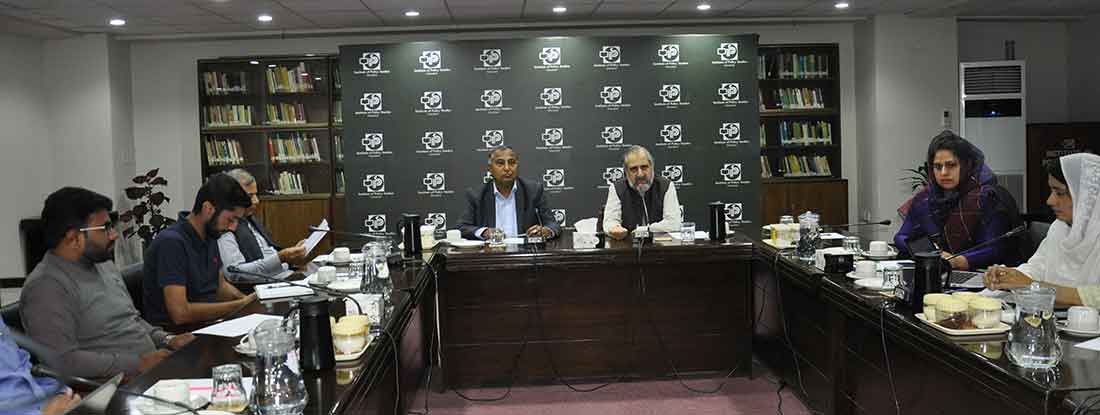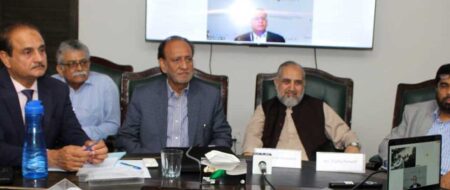‘The Politics over the Grand Ethiopian Renaissance Dam: Need for a Collaborative Management Framework’
Filling of Ethiopia dam’s reservoir legally justified if followed by equitable water-sharing
The long-standing water-sharing discord and competing interests of Ethiopia and Egypt are likely to escalate and destabilize Africa unless a solution is forged. A win-win solution to prevent the escalation, while also fulfilling the states’ interests, lies in a negotiated settlement and formulation of a collaborative water management mechanism based on legally binding principle of reasonable and equitable sharing of water.
This was observed during a session on ‘The Politics over the Grand Ethiopian Renaissance Dam: Need for a Collaborative Management Framework’, held at IPS on October 25, 2022.
The session was addressed by Ambassador (r) Syed Abrar Hussain, vice chairman IPS, Ambassador (r) Ghulam Dastgir, Ambassador (r) Mushtaq Ali Shah, Mirza Hamid Hasan, former federal secretary Water and Power and senior fellow at IPS, Ashfaq Mahmood, former secretary, Water and Power, Syed Abu Ahmad Akif, former federal secretary and senior research fellow IPS, Ameena Sohail, energy lawyer, Farzana Yaqoob, general secretary IPS Working Group on Kashmir, and Naufil Shahrukh, GM Operations IPS.
The political controversy emerging from tensions between Ethiopia versus Egypt and Sudan on the filling of the GERD’s reservoir on the Blue Nile River has resulted in a deadlock situation between these regional states which can escalate and destabilize the African continent if no timely solution is adopted, argued Ambassador Dastgir.
While pointing out the reality of global water stress and dangers to water security, particularly in the Middle East and Africa, Ambassador Mushtaq highlighted that states, while offering a solution or mediation, must keep in view that the GERD issue is a question of survival for both Ethiopia and Egypt.
In line with this, he advocated that Pakistan, in developing a policy approach, should go by the rule and principles of international law, which maintains that lower riparian states should have water-sharing rights while upper riparian states have a right to utilize the water resource while keeping water distribution as reasonable and equitable as they can.
In this regard, Ashfaq Mahmood rested his view that the main cause of conflict is the filling of the dam and allocation of water shares. He maintained that all three states need to sit together and decide the water allocations. While, Pakistan, instead of being outwardly involved in the issue, can act as a supporter of settlement and rational solution.
This was endorsed by Ameena Sohail, who underscored that Pakistan should adopt its role as a supporter and help the states forge an understanding for mutually agreed and equitable water sharing.
Building on this, Syed Akif commented that Pakistan should first consider its diplomatic interests and then play any role only when it falls under its core diplomatic objectives.
Farzana Yaqoob emphasized that Pakistan should play a prominent part and build on its instrumental role as a peacekeeper nation, even if power states have stepped back. Moreover, Pakistan can work on relevant data sharing and expertise sharing with the involved states for reaching a solution.
Furthermore, the speakers maintained that a solution is only possible through the African Union (AU). Though the AU may seem to have a minimum influence owing to its resource constraints and political dominance of a few states, it still can serve as a platform for Ethiopia and Egypt to mutually resolve the issue through cooperative mechanisms and water distribution arrangements.
While unpacking the historical developments of the current issue, Mirza Hamid maintained that Egypt has been receiving an unfairly large share of water and never asked permission from other riparian states when it constructed Aswan Dam. While, on the other hand, Ethiopia has historically been unable to utilize the Nile water, 85% of which originates from its land, due to a lack of technical means for irrigation purposes.
However, over the long history of Nile River water sharing, the power dynamic has shifted, along with the increased capability and willingness of Ethiopia to invest in GERD and harvest the irrigation, hydroelectric, and other benefits.
Based on this, he stated that the construction and filling of the dam by Ethiopia are legally justified as far as it does not deprive lower riparian states of their reasonable and equitable share of water, a criterion maintained in Helsinki Rules and UN Conventions.
He emphasized that a win-win solution lies in adopting water cooperation arrangements and cooperative utilization methods entailing a joint commission for facilitating cooperation, implementation approach in water resource management, problem defining, benefit assessment, multilevel state cooperation, community level participation in implementation, dialogue, and data sharing.
While reflecting on the role of Pakistan, Abrar Hussain maintained that Pakistan should have a general policy approach to the issue based on encouraging a negotiated settlement and supporting fair and equitable distribution of water. And if Pakistan is to play a proactive mediatory role with the willingness of the states concerned, it should share its experiences and expertise while considering its national core objectives.












